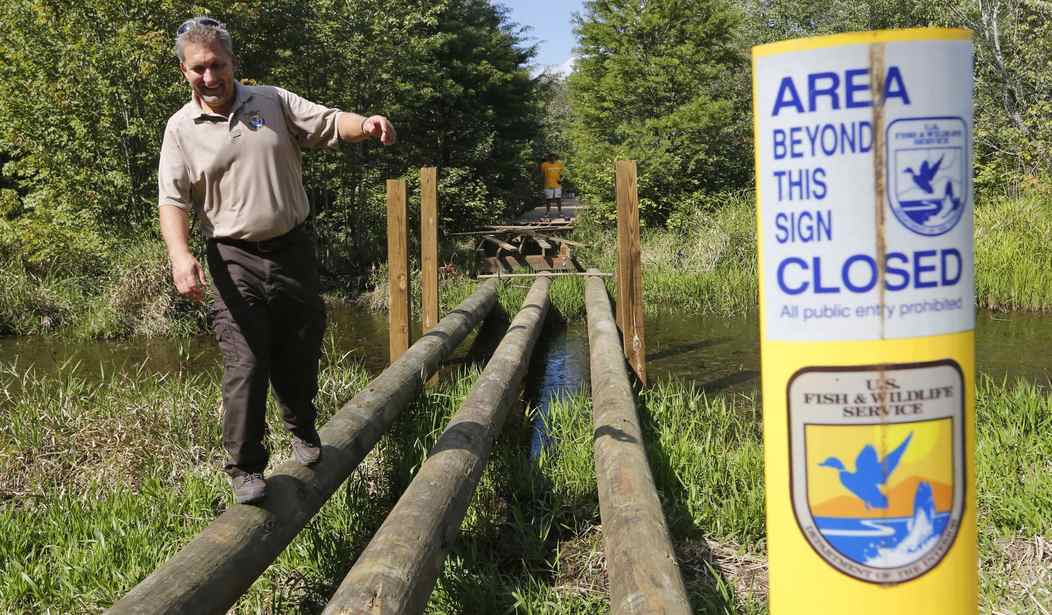Hunters and conservationists should be concerned with the U.S. Fish and Wildlife Service (USFWS)’s proposed climate-centered Biological Integrity, Diversity, and Environmental Health (BIDEH) rule update.
The Biden administration wants to update BIDEH policy governing the National Wildlife Refuge System (Refuge System) to “combat” climate change to ensure “biological integrity, diversity, and environmental health.”
“These proposed regulatory and policy revisions would support conservation throughout the Refuge System in response to both longstanding and contemporary conservation challenges, including the universal and profound effects of climate change on refuge species and ecosystems,” the Federal Register explains. “Together, these proposals would uphold BIDEH across the Refuge System by providing refuge managers with a consistent approach for evaluating and implementing management actions to protect vulnerable species, restore and connect habitats, promote natural processes, sustain vital ecological functions, increase resilience, and adapt to climate change.”
It continues, “The Service did not anticipate the extent of climate change impacts on refuge species and habitats or the need to clarify in regulations our interpretation of and authority to implement the BIDEH mandate. However, in the nearly 25 years since enactment of the Improvement Act, refuges have begun to experience the effects of climate change while continuing to contend with the myriad of other anthropogenic stressors affecting fish, wildlife, plants, and their habitats. Climate change is transforming historical species composition and ecological function of habitats, creating new challenges to traditional wildlife management strategies that were based on stable, stationary baseline conditions. As the Refuge System becomes increasingly vital to addressing the dual threats of biodiversity loss and climate change, the Service recognizes the need to codify both existing and new practices for maintaining BIDEH to assist refuges in responding to these contemporary conservation challenges.”
Recommended
The Refuge System consists of over 500 refuge sites across 850 million U.S. acres.The National Wildlife Refuge System Improvement Act of 1997 explicitly states the Refuge System “was created to conserve fish, wildlife, and plants and their habitats'' under a true conservation mission by “providing Americans opportunities to participate in compatible wildlife-dependent recreation, including fishing and hunting, on System lands and to better appreciate the value of and need for fish and wildlife conservation.” Since 2001, BIDEH policy has prioritized wildlife on the refuge system. But these “new practices'' for maintaining BIDEH on refuges would discourage predator control and agricultural practices, for instance. The USFWS describes these conservation practices as “anthropogenic stressors.”
Originally proposed on February 2nd, 2024, USFWS extended comments for an additional 60 days. The comment period now closes on May 6th, 2024.
This past Wednesday, the House Natural Resources Subcommittee on Water, Wildlife and Fisheries held an oversight hearing on the BIDEH rule and its expected negative effects on refuge management.
Subcommittee Chair Cliff Bentz (R-OR) called the rule misguided and remarked, “This rule would not only hinder proven effective management tools crucial for the well-being of our wildlife and refuge system but also inappropriately restrict sportsmen and sportswomen who contribute significantly to conservation efforts. Regulations such as this must serve the best interests of our wildlife and those who assist in their stewardship, and this rule does neither.”
The subcommittee also warned the BIDEH rule would block refuge managers from carrying out science-based management decisions and force them to deal with more unnecessary red tape.
“The proposed BIDEH rule doesn’t follow site-specific scientific evidence to support best wildlife conservation practices. This would change the purpose of the National Wildlife Refuge System from conserving fish, wildlife, plants to a system that’s focused on climate change. That is a violation of the 1997 Organic Act, which directs a strong and singular wildlife conservation mission for the Refuge System,” Mark Oliva, National Shooting Sports Foundation (NSSF) Manager of Public Affairs, wrote to Townhall.com in an email.
Oliva added, “The proposed BIDEH rule would sideline Fish and Wildlife biologists to centralize authorities with Washington, D.C., bureaucrats over the on-the-ground managers who are in the best position to make these conservation decisions. If formalized, the rule would be detrimental to conserving habitat for game species and other native wildlife. This draft rule was developed without input, either formal or informal, with the sportsmen and women community, who have a longstanding partnership in crafting sound wildlife conservation practices. If promulgated in its current form, this could have devastating negative consequences for sportsmen and women.”
This isn’t the first time USFWS has veered from its mission.
The agency now conditions new fishing and hunting opportunities on national wildlife refuges (NWR) on the implementation of lead phaseouts. Last year, this policy change impacted eight national wildlife refuges: Blackwater, Chincoteague, Eastern Neck, Erie, Great Thicket, Patuxent Research Refuge, Rachel Carson, and Wallops Island National Wildlife Refuges. All these listed places will prohibit lead ammo usage beginning fall 2026.
Hosting eco-grief sessions–not expanding fishing and hunting access on public lands –appeared to be the agency’s top priority last year.
The Biden Department of Interior, where USFWS falls under, has failed to commit to No-Net Loss of hunting and fishing access. Another DOI-adjacent agency, Bureau of Land Management (BLM), has ceded to rewilders - who’ve hijacked conservation - by mulling closures of millions of acres to recreational shooting, OTVing, hunting, and grazing opportunities, for example.
USFWS needs a course correction and to return to its intended mission. For it to rebuild trust, it must immediately withdraw this misguided, anti-conservationist BIDEH rule.

























Join the conversation as a VIP Member